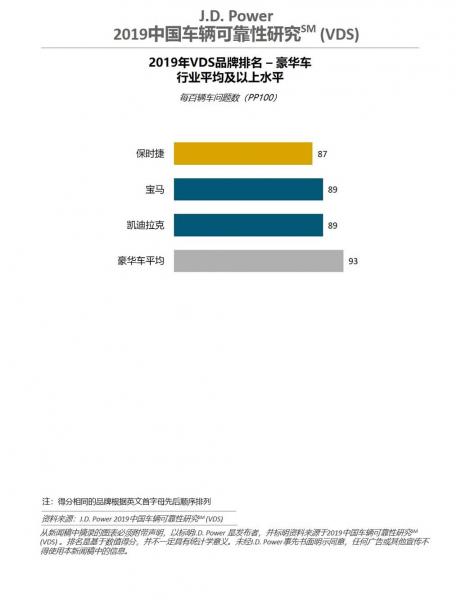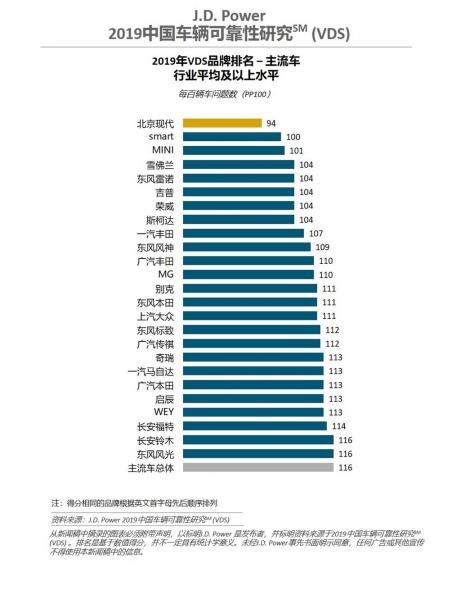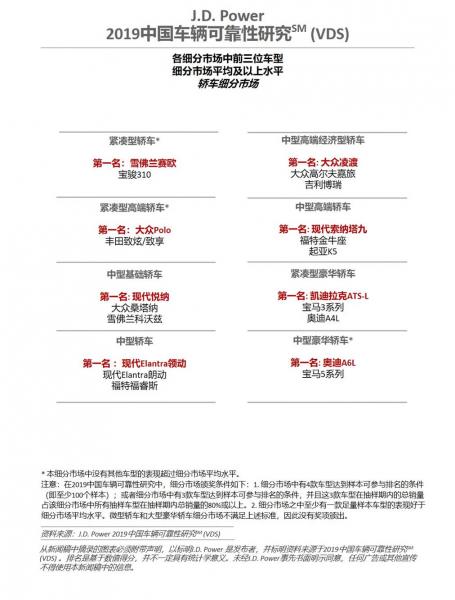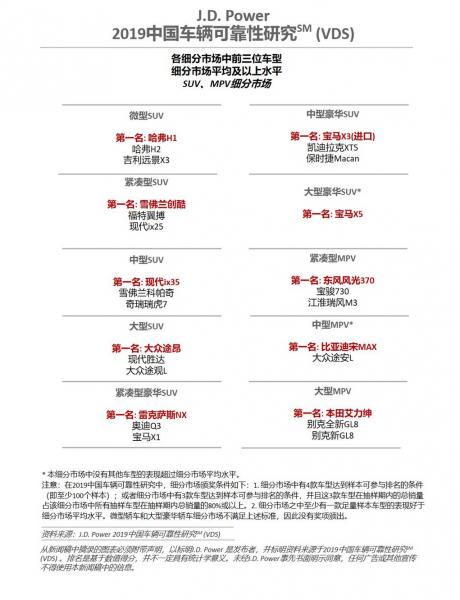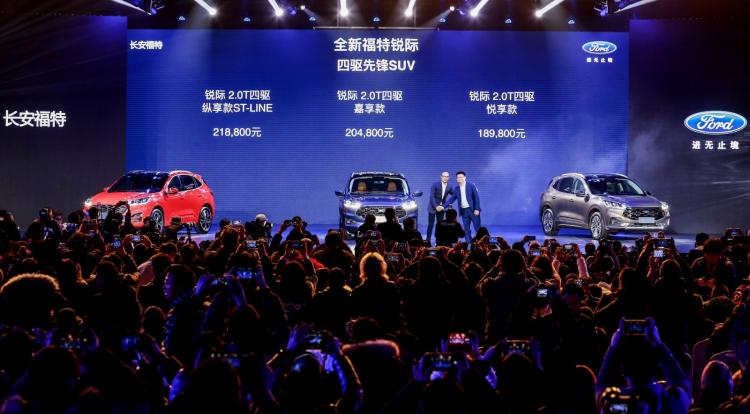Shanghai, November 28, 2019—The 2019 China Vehicle Dependability StudySM (VDS) released today by JD Power, the world’s leading consumer insight and market research organization, shows that in 2019, the overall vehicle reliability of China’s auto industry Significant breakthroughs have been made, and various quality problems have been effectively improved, but complaints about noise problems have increased.
This year is the tenth consecutive year that JD Power has released the China Vehicle Dependability Study. The study measures the problems encountered by Chinese car owners with a vehicle ownership between 13 and 48 months in the past 6 months, including 8 problem categories (body appearance, body interior, driving experience, configuration/handling/dashboard 177 problem symptoms for panels, audio/communications/entertainment/navigation, air conditioning systems, seats, and engine/transmission systems). Overall reliability is measured by the average number of problems per 100 vehicles (PP100), with lower scores indicating better quality.
The study shows that the industry’s overall vehicle reliability score this year is 114 PP100 (down 31 PP100 from 2018). Among them, the average number of problems reported by car owners with a car ownership period of 30 to 48 months (this time period is the range of car ownership period studied in 2018) is 126 PP100, which is 19 PP100 less than that in 2018, and the increase rate is as high as 13%. . Compared with 2018, the PP100 in all question categories in 2019 has achieved varying degrees of progress. Among them, the three categories of “configuration/control/instrument panel”, “engine/transmission system” and “body interior” have made the greatest progress, increasing by 7.1 PP100, 5.5 PP100 and 5.2 PP100 respectively.
Cai Ming, general manager of JD Power China’s automotive product division, said: “Compared to the slight regression in 2018, the Chinese auto industry has made gratifying progress in vehicle reliability in 2019. In the case of sluggish sales in the auto market, the quality of new cars and the quality of vehicles The improvement in both reliability shows that car companies pay more attention to quality improvement in the cold winter of the car market, and strive to meet new market opportunities in the best condition.”
The study also found that in 2019, consumers complained more about noise problems. Excessive wind noise (5.0 PP100, referring to noise from around the vehicle body) and excessive tire noise (4.6 PP100, referring to noise from under the vehicle body) The two problems that respondents complained about the most, and the number of problems increased by 1.7 PP100 and 1.4 PP100 respectively compared with the previous year.
In this regard, Cai Ming said: “Chinese consumers are extremely sensitive to noise, and noise issues are at the forefront of new car quality research and vehicle reliability research. It is recommended that manufacturers make targeted adjustments to Chinese consumers’ preferences before launching products, and adopt There are many ways to reduce the noise in the car, such as controlling the noise level of the noise source and improving the sound insulation effect of the vehicle.”
The following are the key findings of the 2019 study:
Self-owned brands have made significant progress, and the gap with international brands has narrowed year by year: In 2019, self-owned brands made the most obvious progress in terms of vehicle reliability, with the number of problems reduced by 43 PP100, which is a greater improvement than international brands (reduced by 28 PP100). As a result, the gap in the number of questions between self-owned brands and international brands narrowed to 15 PP100, the smallest difference since 2015.
The number of problems of failure/inoperability, noise/abnormal noise and wear/fading increases year by year with the increase of the car ownership period: compared with owners who have owned the car for one to two years, car owners who have owned the car for three to four years have more problems with failure or inability to work. 9.2 PP100 higher on the test and 6.5 PP100 higher on the wear and fading category. Among them, the specific indicator of front wipers/washers malfunctioning or not working has the largest increase in the number of problems per 100 vehicles with the increase of vehicle ownership time.
Top-Rated Makes and Models
Porsche (87 PP100) was awarded first place in vehicle reliability in the luxury segment. BMW and Cadillac (89 PP100) tied for second place in vehicle reliability in the luxury segment.
Beijing Hyundai (94 PP100) ranked first in vehicle reliability in the mainstream car segment, smart (100 PP100) ranked second, and MINI (101 PP100) ranked third.
A total of 18 models won market segment awards in the 2019 China Vehicle Reliability Study.
Four models of Beijing Hyundai have won market segment awards, namely Hyundai Yena, Hyundai Elantra, Hyundai Sonata Nine and Hyundai ix35.
Three models of SAIC Volkswagen have won market segment awards, namely Volkswagen Polo, Volkswagen Lingdu and Volkswagen Touron.
The BMW brand won awards at the model level for the BMW X3 (imported) and the BMW X5.
The Chevrolet brand won awards at the model level: Chevrolet Sail and Chevrolet Creator.
Other models that won awards in their respective market segments include Audi A6L, BYD Song MAX, Cadillac ATS-L, Dongfeng Fengguang 370, Haval H1, Honda Alison and Lexus NX.
The 2019 China Vehicle Dependability Study (VDS) is based on real feedback from 34,820 vehicle owners who purchased vehicles between January 2015 and June 2018. The research covers 284 vehicle models from 69 brands, and data collection was conducted in 71 major Chinese cities between January 2019 and July 2019.
